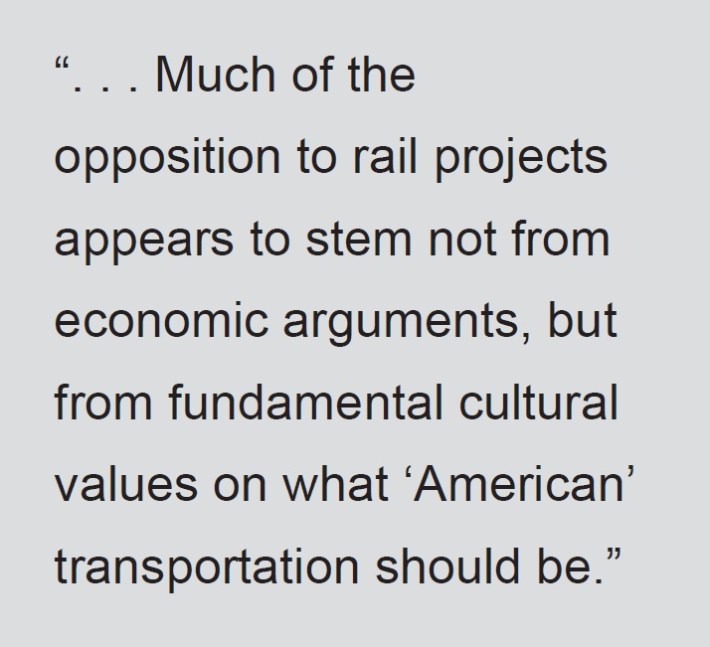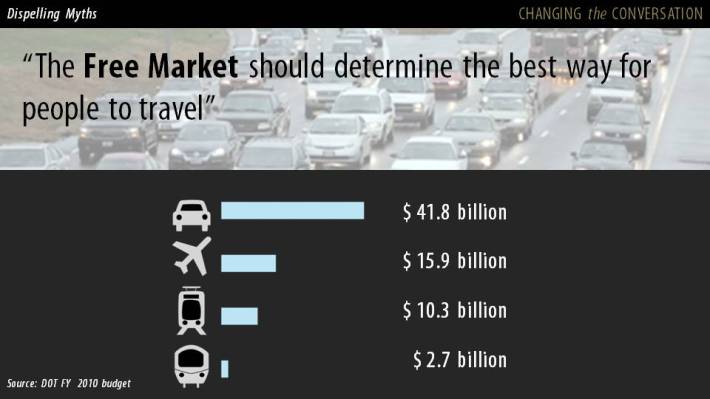Stop me if you’ve heard these before:

“Most Americans don’t use railroads, they use cars.”
“There’s no better example of excessive government spending than the $53 billion President Obama allocated for high-speed rail in his 2012 budget.”
“Would you pay $1,000 so that someone -- probably not you -- can ride high-speed trains 58 miles a year?”
“High-speed rail may be feasible in parts of Europe or Japan, where the population density is much higher, but without enough people packed into a given space, there will never be enough riders to repay the cost of building and maintaining a high-speed rail system.”
Critics of federal initiatives to promote high-speed rail have launched these attacks with great frequency over the past few years. Their targets have been projects in Florida, Wisconsin, California, or even federal regulators and Secretary Ray LaHood. But their primary intended audience was the American people, and, according to the American Public Transportation Association, there has been a "well-oiled campaign" (pun probably intended) to make sure their message was repeated, and loudly.
APTA is trying to unplug that propaganda machine with its new "Inventory of the Criticisms of High-Speed Rail With Suggested Responses and Counterpoints" [PDF]. It methodically lists no fewer than 37 specific objections to pursuing high-speed rail (grouped thematically into eight chapters) and exposes them for “lack of veracity and vision.” The four critiques quoted above (the first two from Diana Furchtgott-Roth in the Washington Examiner, the third from CATO's Randall O'Toole and the last from Thomas Sowell in The Albany Herald), barely scratch the surface of the anti-HSR literature addressed by the report.
The aim of the report is to give HSR supporters a way to return fire when detractors say things like:
- High-speed rail is too expensive and will never be profitable. APTA says the question of profit is "dangerously misleading and irrelevant" since "the economic value generated by passenger transportation historically is captured by the businesses served by the transportation network, not by the carriers."
- It doesn't have broad enough support. On the contrary, says APTA: Even the Congressional leaders who have been the most critical of the Obama administration's allocation of rail funds "have set about finding creative ways of financing the initiative in the hope of encouraging greater private-sector support and leadership."
- HSR might work elsewhere, but it won't work in the U.S. Oh really? Sure, intercity passenger rail currently serves "the smallest share of riders among all modes of passenger transportation," says APTA. But that's changing. "In the Northeast Corridor, intercity trains enjoy a market share almost equal to the airlines, and nationally, ridership on Amtrak is at an all-time high."
Many of the debunked criticisms point to some combination of unrecoverable cost and only marginal benefits, with the assumption that taxpayers will be on the hook for costs and that benefits will be confined to a select few. Not so: APTA cites ample evidence that high-speed passenger rail could be capable of operating profits and wide-ranging benefits.
Beyond reiterating HSR’s many merits, the report exposes the double standard so frequently invoked in the HSR debate: that of government subsidization. What is it that makes HSR off-limits for government spending, while the construction and maintenance of the interstate highway system was undertaken at such great federal expense? The truth, as the report points out, is that one would be hard pressed to find a mode of transportation that isn’t subsidized in some way.
And it makes sense, because railroads, highways, airports, and even sidewalks are all parts of a much larger transportation system that enables society to function and grow. “What proponents are arguing is that the nation needs a more balanced use of all three modes,” the report reads, “Particularly… where airports and highways have become so congested that long delays and lost productivity are routine.”

Population growth and the anticipated growth of urban areas is one primary argument for the urgency of high-speed rail. Last year, a team of Master’s students from the University of Pennsylvania (full disclosure: I was one of them) concluded that it wasn't enough to simply debunk the critics. It may be better to craft a new high-speed rail message that can stand on its own.
That message centered on this question of the changing economic geographies of the 21st century. Economic activity is coalescing into megaregions (or megapolises), and if economic and population growth is to continue at anticipated rates, those megaregions face very specific capacity constraints on core infrastructure systems, particularly transportation. In a debate filled with claims of skyrocketing costs, the Penn report concludes, “the highest cost would be the cost of doing nothing.”
Or, as Building America’s Future co-founder Ed Rendell said recently to an audience in Jacksonville, when it comes to infrastructure, “You can pay now, or you can pay later.”





